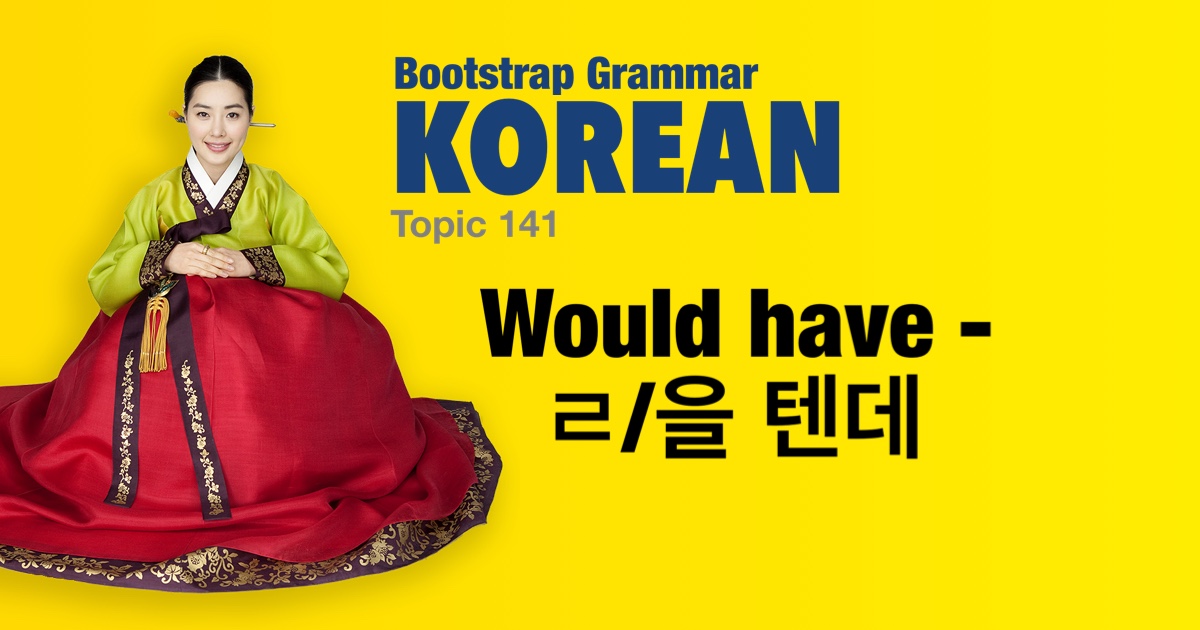Korean grammar - Would have - ㄹ/을 텐데 |
|||
|
|||
The pattern 텐데 is commonly used to express probability or conjecture. When used at the end of a sentence (ㄹ/을 텐데요) it is common to use this form in the second clause of a hypothetical (다면). When used in the middle of a sentence ㄹ/을 텐데 has the meaning of 'it is probable that … so/but'. |
| Examples: | |
|
그 가게 쌀은 더 비쌌을 텐데요.
Rice would have been more expensive in that shop. |
|
|
학교에 열심히 다녔다면 좋은 성적을 받았을 텐데요.
If (I) had worked hard in school, (I) would have received good grades. |
|
|
옷을 따뜻하게 입었다면 감기에 걸리지 않았을 텐데요.
If (I) had worn warm clothes, (I) wouldn't have caught a cold. |
|
|
날씨가 좋았다면 저는 공원에 갔을 텐데요.
If the weather had been nice, (I) would have gone to the park. |
|
|
제가 돈이 있었다면 그것을 샀을 텐데요.
If I had money, (I) would have bought that. |
|
|
제가 돈이 있으면 그것을 살 텐데요.
(I) would buy that if I had money. |
|
|
음식이 더 있으면 좋을 텐데요.
It would be good if there was more food. |
|
|
길이 막힐 텐데 지하철로 가십시오.
The road will be blocked, so take the subway.
|
|
|
김치찌개가 매울 텐데 괜찮겠어요?
Kimchi jjigae must be spicy but is that ok?
|
|
|
정구 씨가 많이 늦을 텐데 기다릴 거예요?
Chonggu must be very late, but will (you) wait? |
|
|
날씨가 추울 텐데 긴 바지를 입어요.
The weather is likely to be cold, so (I) suggest (you) wear long pants. |
|
|
다른 사람도 좀 생각하면 좋을 텐데요.
t would be good if (you) could also think a little of other people. |
|
|
오늘 시험을 세 개 봤어요. 많이 피곤할 텐데 푹 쉬어요.
(I) took three exams today. (You) must be very tired - rest well. |
|
|
바쁠 텐데 와 줘서 고마워요.
You must be busy - thank (you) for coming. |
|
|
힘드실 텐데 초대해 주셔서 감사합니다.
It must be difficult but thank (you) for inviting me.
|
|
|
먼 길 오시느라 힘드셨을 텐데 여기 좀 앉아서 쉬세요. [IS 먼 a contraction?]
It must have been difficult for (you) to come from a long way, so please sit here and rest.
|
|
|
나는 야근을 해서 늦을 텐데 너희들끼리 먼저 저녁을 먹는 게 어때?
(I) will probably be late because I will have to work overtime, so why don't you (plural) eat dinner together first? |
|
|
집에 어머니가 계실 텐데 왜 전화를 안 받으시지?
If (your) mother is at home, why isn't (she) answering the phone? |
|
|
저 사람은 학생일 텐데 선생님보다 나이가 많아 보이네.
That person must be a student, but he looks older than the teacher. |
|
|
길이 막힐 텐데 전기 자전거를 타는 게 어때요.
The road will be blocked, so how about riding an electric bike? |
|
|
내일은 바쁠 텐데 다음에 만나기로 해요.
Tomorrow (I) will probably be busy, so (we) will meet next time. |
|
|
민수 씨는 치마를 입으면 예쁠텐데 왜 안 입어요?
Minsu will (probably) pretty if (she) wore a skirt, so why not? |
|
|
그 커피숍은 아홉 시에 문을 닫을 텐데 다른 곳으로 가죠.
The coffee shop probably closes at nine o'clock, so let's go somewhere else. |
|
|
길이 막힐 텐데 좀 일찍 출발하는 게 어때요?
The road will probably be blocked, so why not start a little earlier? |
|
|
그녀는 수업 중일 텐데 나중에 전화해 보세요.
She must be in class, so please call (her) later. |
|
|
표가 없을 텐데 집에서 TV로 보는 게어때요?
There are probably no tickets, but how about watching it on TV at home? |
|
 |
|




